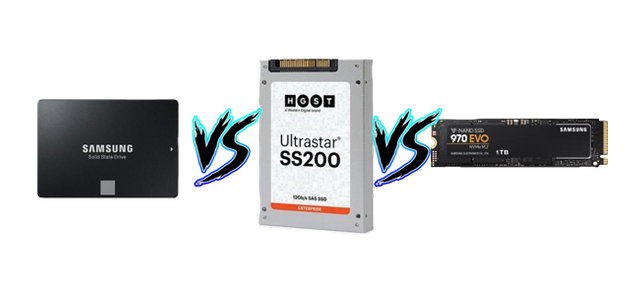SATA vs SAS vs NVMe Performance Breakdown

SATA vs SAS vs NVMe Overview
This is a quick breakdown of the differences between SATA vs SAS vs NVMe. After looking at the performance below, you will be able to decide which one best suits your needs.
- SATA (Serial Advanced Technology Advancement)
- Most common
- Least reliable
- Slow
- 5400 - 7200 RPM Hard Drives
- Half duplex (Can't read and write simultaneously)
- 6 GB/s connection
- Cheap (1 TB SSD $150)
- SAS (Serial Attached Storage)
- Commonplace in data centers
- Very reliable
- Error checking is built-in
- Fast
- 15k RPM Hard Drives
- Full Duplex (Simultaneous read and write)
- 12 GB/s connection
- Expensive (800 GB SSD $600) - Pretty much enterprise only
- NVMe (Non-Volatile Memory Express)
- Common in new PC builds, common in data center SANs for cache on tiered storage.
- Reliable
- Fastest
- 16-32 GB/s connection when directly plugged into PCIe
- 12 GB/s connection still applies when hot-swapped via SAS connection
- Full Duplex
- Higher Bandwidth (Able to process the most at one time)
- Expensive (1 TB Residential $300-$400 | 1.2 TB Enterprise $1200)
SATA vs SAS vs NVMe | Performance Winner: NVMe
SATA vs SAS vs NVMe | Budget Winner: SATA
What about SAS? Well, in enterprise environments you see this very often with pretty much every tiered storage device having it. Most of what is on the market today is a mixture of SAS and NVMe for business. These hybrid drives are crazy expensive but give system administrators the ability to claim some of the speed from NVMe without purchasing entirely new devices. While this may seem trivial when you are talking thousands of dollars, this becomes a budget issue. SAS also has the error checking built into the interface, which in turn, gives greater reliability in theory. Personally, I think the future enterprise devices will have some type of new connector or housing that will make NVMe devices hot-swappable without the 12 GB/s SAS limitation. That said, we aren't quite there yet, and the prevalence of SAS in enterprise space will continue.Leave any Questions and Comments below and I will get back to you. I regularly publish on YouTube, Steemit, and christitus.com so if you’d like to see more videos and articles click the subscribe button in the top right.
Posted from my blog with SteemPress : https://www.christitus.com/2018/10/05/sata-vs-sas-vs-nvme/
@christitus, I gave you a vote!
If you follow me, I will also follow you in return!
Very good write-up on the uses of different storage interfaces. I hope that you'll write more, as I'm now following. It'd be interesting to see the differences different, older, interfaces might still have, like SCSI, IDE (PATA), and others.
Hi, @christitus!
You just got a 0.69% upvote from SteemPlus!
To get higher upvotes, earn more SteemPlus Points (SPP). On your Steemit wallet, check your SPP balance and click on "How to earn SPP?" to find out all the ways to earn.
If you're not using SteemPlus yet, please check our last posts in here to see the many ways in which SteemPlus can improve your Steem experience on Steemit and Busy.